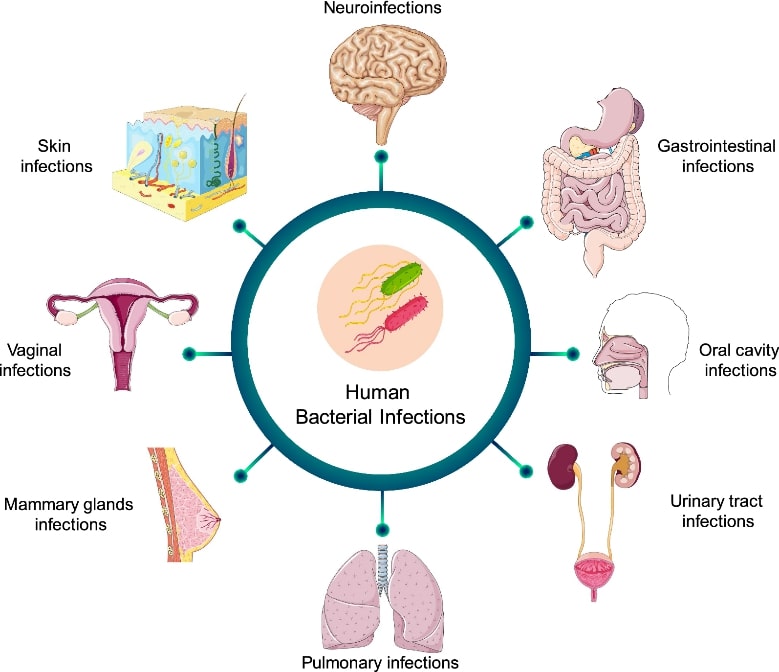Exosome-Based Vaccine against Non-Viral Infection
Infectious diseases cause huge health and socioeconomic burden globally, killing more than 17 million people each year. Currently, there is still a large gap in vaccines against non-viral pathogens. Due to the limitations of traditional vaccines, there is an urgent need to develop more efficient and safer vaccines. Several studies have found that exosomes can be used as vaccines to generate efficient immune responses. With years of experience in antibody development and a full set of exosome research platforms, Creative Biolabs can provide customers with first-class exosome-based vaccine discovery services.
Non-Viral Infection
In contrast to viral infections, non-viral infections are caused by non-viral pathogens such as bacteria and parasites. Bacterial infection is an acute systemic infection caused by pathogens or opportunistic pathogens invading the blood circulation to grow and multiply, producing toxins and other metabolites. Patients with underlying diseases or untreated bacterial infections may develop septicemia or sepsis. Parasitic infections are diseases caused by parasites invading the human body. Parasites are eukaryotic organisms that live in or on a host. Patients infected with Plasmodium have symptoms such as impaired consciousness, respiratory distress, jaundice, profuse sweating, vomiting, diarrhea, and convulsions. Malaria can also lead to various complications, including anemia, hypoglycemia, cerebral malaria, pulmonary edema, and organ failure. Infants, the elderly, and immunocompromised individuals are more susceptible to parasitic infections.
 Fig.1 Most common human bacterial infections.1,2
Fig.1 Most common human bacterial infections.1,2
Exosome-based Vaccine against Non-Viral Infection
In recent decades, due to the abuse of antibiotic drugs, a large number of microorganisms have developed multi-drug resistance to antibiotics. In addition, drugs against parasitic infections are limited. Vaccination is the most cost-effective means of preventing infectious diseases. Recent studies have shown that exosomes can be used as vaccines against some non-viral infections to induce strong immune responses. Bacteria and parasites can interact with the host immune system by releasing exosomes and may be effective immunomodulators.
Outer membrane vesicles (OMVs) are vesicle-like structures secreted by Gram-negative bacteria. OMVs can reveal specific antigens in their native conformation. Therefore, OMV is expected to be a natural vaccine capable of inducing humoral and cell-mediated immune responses. Further functional modification of OMV can improve the yield and immunogenicity of OMV, and reduce the effect of endotoxin. For example, based on conventional vaccines, an OMV vaccine against pertussis was obtained from a defective B. pertussis. The OMV vaccine has been found to induce sustained protective immunity that protects the lungs of mice from infection. Cytoplasmic membrane vesicles (CMVs) are vesicle-like structures secreted by Gram-positive bacteria. Engineered MVs derived from S. aureus have been found to show better immunogenicity, protecting mice from S. aureus-induced sepsis. Therefore, bacterial-derived exosomes are expected to be used as safe and effective cell-free vaccines.
Toxoplasma gondii is an obligate intracellular parasite that infects humans and livestock. Current Toxoplasma gondii vaccines are ineffective in humans. In a recent study, exosomes released from dendritic cells stimulated by Toxoplasma gondii lysate (TLA exo) are promising as a vaccine. TLA exo in the form of eye drops has been found to elicit strong humoral and mucosal immune responses in mice, producing high levels of antibodies.
Creative Biolabs has many years of experience in exosome-related services and a team of scientists with mature technology. Combined with a well-established exosome research platform, our scientists can provide customers with the highest quality exosome vaccine research services. Please do not hesitate to contact us to explore innovative exosome vaccines together.
References
-
Cano, A.; et al. State-of-the-art polymeric nanoparticles as promising therapeutic tools against human bacterial infections. Journal of Nanobiotechnology. 2020, 18(1):156.
-
under Open Access license CC BY 4.0, without modification.
For Research Use Only. Cannot be used by patients.
Related Services:

 Fig.1 Most common human bacterial infections.1,2
Fig.1 Most common human bacterial infections.1,2








